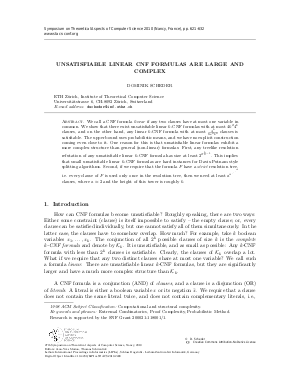Unsatisfiable Linear CNF Formulas Are Large and Complex
Author Dominik Scheder
-
Part of:
Volume:
27th International Symposium on Theoretical Aspects of Computer Science (STACS 2010)
Part of: Series: Leibniz International Proceedings in Informatics (LIPIcs)
Part of: Conference: Symposium on Theoretical Aspects of Computer Science (STACS) - License:
 Creative Commons Attribution-NoDerivs 3.0 Unported license
Creative Commons Attribution-NoDerivs 3.0 Unported license
- Publication Date: 2010-03-09
File

PDF
LIPIcs.STACS.2010.2490.pdf
- Filesize: 319 kB
- 12 pages
Document Identifiers
Subject Classification
Keywords
- Extremal combinatorics
- proof complexity
- probabilistic method
Metrics
- Access Statistics
-
Total Accesses (updated on a weekly basis)
0Document
0Metadata
Abstract
We call a CNF formula {\em linear} if any two clauses have at most one variable in common. We show that there exist unsatisfiable linear $k$-CNF formulas with at most $4k^24^k$ clauses, and on the other hand, any linear $k$-CNF formula with at most $\frac{4^k}{8e^2k^2}$ clauses is satisfiable. The upper bound uses probabilistic means, and we have no explicit construction coming even close to it. One reason for this is that unsatisfiable linear formulas exhibit a more complex structure than general (non-linear) formulas: First, any treelike resolution refutation of any unsatisfiable linear $k$-CNF formula has size at least $2^{2^{\frac{k}{2}-1}}$. This implies that small unsatisfiable linear $k$-CNF formulas are hard instances for Davis-Putnam style splitting algorithms. Second, if we require that the formula $F$ have a {\em strict} resolution tree, i.e. every clause of $F$ is used only once in the resolution tree, then we need at least $a^{a^{\iddots^a}}$ clauses, where $a \approx 2$ and the height of this tower is roughly $k$.
Cite As Get BibTex
Dominik Scheder. Unsatisfiable Linear CNF Formulas Are Large and Complex. In 27th International Symposium on Theoretical Aspects of Computer Science. Leibniz International Proceedings in Informatics (LIPIcs), Volume 5, pp. 621-632, Schloss Dagstuhl – Leibniz-Zentrum für Informatik (2010)
https://doi.org/10.4230/LIPIcs.STACS.2010.2490
BibTex
@InProceedings{scheder:LIPIcs.STACS.2010.2490,
author = {Scheder, Dominik},
title = {{Unsatisfiable Linear CNF Formulas Are Large and Complex}},
booktitle = {27th International Symposium on Theoretical Aspects of Computer Science},
pages = {621--632},
series = {Leibniz International Proceedings in Informatics (LIPIcs)},
ISBN = {978-3-939897-16-3},
ISSN = {1868-8969},
year = {2010},
volume = {5},
editor = {Marion, Jean-Yves and Schwentick, Thomas},
publisher = {Schloss Dagstuhl -- Leibniz-Zentrum f{\"u}r Informatik},
address = {Dagstuhl, Germany},
URL = {https://drops.dagstuhl.de/entities/document/10.4230/LIPIcs.STACS.2010.2490},
URN = {urn:nbn:de:0030-drops-24901},
doi = {10.4230/LIPIcs.STACS.2010.2490},
annote = {Keywords: Extremal combinatorics, proof complexity, probabilistic method}
}
